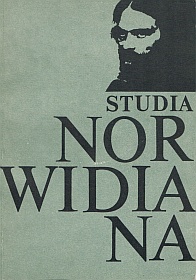Norwid on Mickiewicz - A Post-Romantic View
Abstract
Adam Mickiewicz, the great Romantic poet was a major influence on Norwid’s generation. He appears in Norwid’s work in different roles: as the Romantic poet, the political activist, and finally, as the individual whom Norwid personally knew. The younger poet’s initial veneration of Mickiewicz changed to tortured defiance of the latter’s mystical-political views during the 1848 confrontation in Rome. Norwid’s rejection of Mickiewicz’s Panslavism and Towianism did not mean that he questioned Mickiewicz’s poetic greatness. Though in 1849 Norwid took a stand against „Wallenrodism” (Zwolon, Niewola), he maintained friendly contacts with Mickiewicz in Paris. The poem Do A. M. (1852) shows his recognition of the great influence that Mickiewicz exerted on the younger generation of Polish émigrés.
As to Mickiewicz, he made only a couple of negative comments on Norwid’s work while at the same time helping him in various ways - this makes the interpretation of his overall view difficult. With Mickiewicz’s death in 1855 his figure acquired a symbolic significance in Norwid’s eyes. As the poem [Coś ty Atenom zrobił, Sokratesie...] shows, he believed that only posterity would be able to appreciate Mickiewicz both as a poet and as a human being; he also mentions Mickiewicz with great sympathy in both his Czarne kwiaty and Białe kwiaty. Nonetheless, it is only the Słowacki lectures (1860) that provide Norwid’s first comprehensive statement on Mickiewicz. From these it transpires that while Norwid regards Mickiewicz worthy of respect he does not really approve of his politics, and that he regards the author of Dziady as a prophet of the past, a Moses-like figure. He belongs to the Old Testament, while Norwid thinks of himself as an apostle from the New Testament, a representative of a broader and more universal (Christian) truth. This did not mean that Norwid held Mickiewicz as a “false prophet”; on the other hand, he did not regard him as a truly national poet either, for he found that Pan Tadeusz was a „regional masterpiece”, notanational one. In a word, Mickiewicz was a powerful father-figure for Norwid whom - for all the respect for his work and his memory - the author of Vade-mecum had to reject in order to enfold his own „message”.
Copyright (c) 1983 Studia Norwidiana

This work is licensed under a Creative Commons Attribution-NonCommercial-NoDerivatives 4.0 International License.





